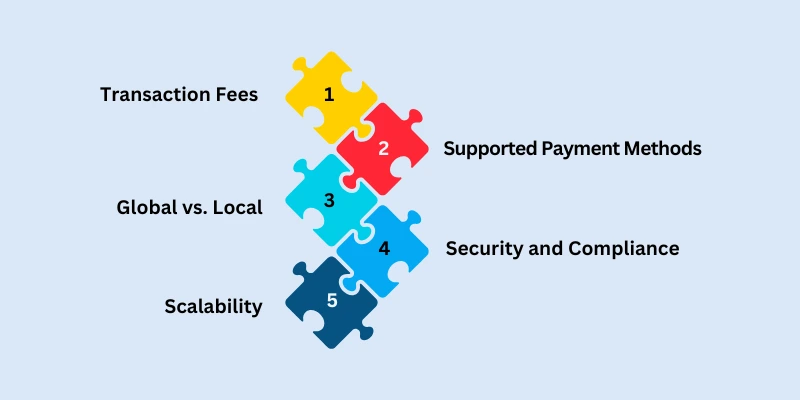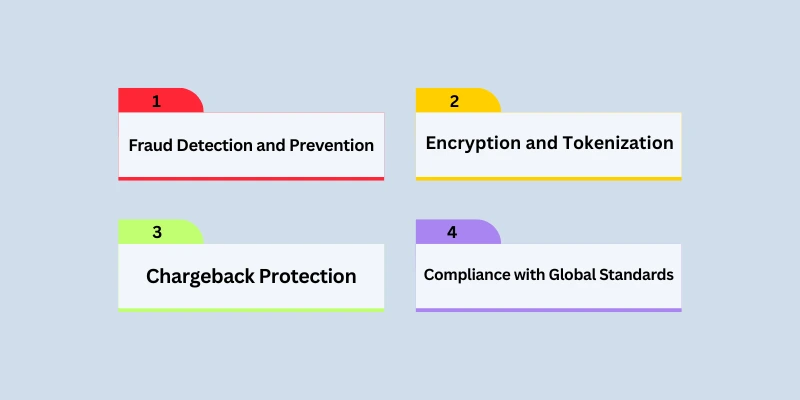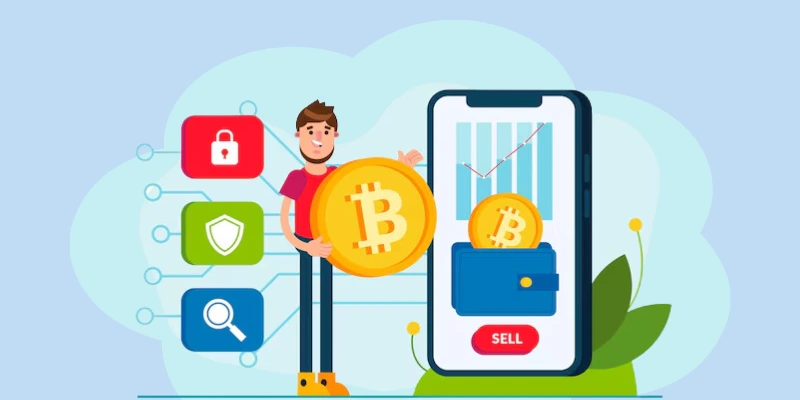A crypto payment gateway is an essential online tool that makes it easier for online stores, mobile app development, and coin deals to accept and handle payments. As a secure middleman, it lets businesses accept different payment gateways, like digital wallets and credit cards, while protecting private data and sending it safely between the customer and the merchant's bank.
Picking the right payment gateway is very important. If you choose a suitable gateway, you can make transactions much faster, improve the customer experience, and help your business grow. This means easy credit card handling for standard businesses. For businesses that want to start accepting cryptocurrencies, a Crypto Payment Gateway like BitPay can help make transactions safe and quick in a rapidly changing market. The right choice can lead to improved turn rates and customer happiness, eventually driving business growth.
This blog aims to help companies find the most suitable payment gateway choices for their particular needs, whether they are looking for traditional solutions or studying crypto payment gateway development. By knowing the details of different ports, companies can make informed choices that align with their practical goals and customer standards.
Understanding What a Payment Gateway Does
A payment gateway works as a middleman in the transaction process, enabling contact between buyers, businesses, and banks. When a customer starts a purchase, their payment details are safely transmitted to the payment provider via encryption, which then sends this information to the receiving bank for clearance.
Transaction Process
Role of the Payment Gateway: Acts as a middleman between buyers, retailers, and banks.
Process Steps:
-
-
The customer starts a buy and enters payment information.
-
Payment information is safely passed to the payment provider.
-
Gateway sends data to the purchasing bank, which interacts with the card network and originating bank for permission.
-
Upon approval, funds are moved from the customer’s account to the merchant’s account.
-
Traditional vs. Crypto Gateways: Both types follow a similar process, but crypto gateways utilize blockchain technology for safe transfers.
Security
Security is essential in payment handling. Payment platforms employ different gateways to protect private data and prevent scams.
-
-
Encryption: Protects private data during transfer, ensuring secrecy.
-
Fraud Prevention: Uses gateways like IP tracking and machine learning to identify shady behaviours.
-
Blockchain Technology: Enhances security in crypto payment platforms by offering an open and unchangeable transaction record.
-
Types of Payment Gateways
Different types of payment platforms cater to different business goals and plans.
-
-
Hosted Gateways: Redirect buyers to a safe page for payment handling.
-
Non-hosted Gateways: Allow purchases to occur straight on the merchant’s website.
-
Crypto Payment Gateways: Specialized choices like BitPay cater directly to companies taking cryptocurrency.
-
Business Model Suitability: Each type serves different business models, including e-commerce and mobile applications, allowing retailers to pick options that fit with their needs.
-
In some cases, such as banking, developing a robust gateway, such as a Crypto banking payment gateway, is important for enhancing security while dealing with crypto coins.
Key Factors to Consider When Choosing a Payment Gateway

Choosing the right payment gateway is crucial for companies looking to improve their transaction processes and enhance customer happiness. Understanding the key factors involved can help in making an informed choice.
Transaction Fees
Transaction fees can change greatly between standard and crypto payment platforms.
-
-
Traditional Gateways: Typically charge a portion of each transaction plus a set fee, which can add up for small companies.
-
Crypto Gateways: Often have lower fees, but changes in cryptocurrency prices can impact total costs.
-
Business Strategies: Small companies should discuss fees and explore flat-rate choices, while bigger firms may benefit from tiered price plans to control costs effectively.
-
Supported Payment Methods
Supporting multiple payment gateways is important for responding to different customer tastes.
-
-
Range of Options: From credit cards to digital wallets and cryptocurrencies, a bigger selection improves user experience.
-
Crypto Development: If exploring crypto payment gateway development, ensure the connection with popular cryptocurrencies to draw tech-savvy customers.
-
Global vs. Local
Understanding the regional reach of your payment gateway is important.
-
-
International Support: Check if the gateway allows foreign funds and transfers, making it perfect for global operations.
-
Mobile App Development: For businesses involved in mobile app development, a gateway that supports various currencies can enable easier deals across countries.
-
Security and Compliance
Security is important when handling banking activities.
-
-
PCI DSS Compliance: Traditional ports must stick to PCI DSS guidelines to protect user data.
-
Blockchain Security: Crypto platforms rely on blockchain technology for secure transfers, offering openness and cutting scam risks.
-
Scalability
As your business grows, your payment gateway should be able to scale properly.
-
-
Traditional gates: Look for gates that can handle higher trade numbers without compromising speed.
-
Crypto Gateways like BitPay: Ensure they can handle growth in bitcoin transactions as your customer base grows.
-
By considering these factors, companies can pick a payment platform that fits their working needs and growth goals. You can hire dedicated developers from JPLoft; they can help you develop a robust payment gateway.
Hosted vs. Non-Hosted Payment Gateways
Hosted and non-hosted payment platforms are important components of online deals. Each has unique benefits and drawbacks based on business needs. Understanding these differences can help companies choose the right option.
Hosted Gateways
Hosted payment platforms, such as PayPal and BitPay, provide a simple option for smaller businesses.
-
-
Ease of Use: They send users to a safe payment page housed by the gateway service, easing the setup process.
-
Security: Since private data is handled by the server, businesses have reduced responsibility for data leaks.
-
Ideal for Startups: Smaller businesses benefit from lower startup costs and minimal technical needs, allowing them to focus on growth without extensive IT systems.
-
Non-Hosted Gateways
Non-hosted payment platforms help businesses to keep full control over the payment process.
-
-
Customization: These platforms allow extensive customizing of the checkout experience, matching it with the brand’s personality.
-
Control: Businesses handle customer data directly, improving tracking and marketing powers.
-
Suitability for Larger Enterprises: Ideal for bigger businesses or those with specific needs, they offer greater freedom but require more expert resources and investment.
-
Pros and Cons
Comparing hosted and non-hosted ports shows key factors for businesses:
-
-
User Experience: Non-hosted gateways provide a smooth experience as customers stay on the merchant's site, encouraging trust. In comparison, managed ports may cause pause due to reroute.
-
Branding: Non-hosted choices allow for uniform branding throughout the checkout process, while hosted solutions generally limit customization.
-
Integration in Mobile Apps: Both types can be merged into mobile app development however, non-hosted platforms offer more control over user experience.
-
By weighing these factors, companies can pick a payment gateway that best fits their practical goals and customer standards.
User Experience and Checkout Flow
A smooth user experience during the checkout process is essential for reducing cart loss, especially for businesses utilizing crypto-banking payment platforms. A fast and efficient checkout flow not only improves customer happiness but also encourages return purchases.
-
-
Checkout Simplicity Importance: A faster checkout process reduces delay, making it easier for customers to finish their orders.
-
Impact on Cart Abandonment: Complicated or long checkout processes often lead to abandoned carts, especially in crypto deals where users may be new with the process.
-
Crypto Payment Gateways: Simplified platforms, such as those given by BitPay, can help clarify crypto purchases for users.
-
Mobile Optimization
With the growing frequency of mobile shopping, a mobile-friendly checkout is important.
-
-
User Expectations: Consumers expect a smooth experience across devices; a badly managed mobile checkout can discourage potential customers.
-
Integration with Mobile Apps: When adding Top crypto payment gateways into mobile app development, ensure that the payment process is simple and responsive to improve user involvement.
-
Customization
Customization plays a major part in building brand trust and improving the overall customer experience.
-
-
Brand Identity: Crypto payment platforms like BitPay allow businesses to tailor the checkout experience to match their image, promoting customer allegiance.
-
Seamless Experience: Customizable features can simplify the payment process, making it feel more integrated and less transactional, which is crucial for keeping customers in a competitive market.
-
By focusing on these aspects—checkout ease, mobile optimization, and customization—businesses can greatly improve user experience and drive sales.
Integration with E-commerce Platforms and Business Software
Integrating payment gateways with e-commerce platforms and business software is important for simplifying operations and improving operating efficiency. Both standard and crypto payment platforms offer various connection choices to meet different business needs.
Compatibility
-
-
E-commerce Platforms: Traditional payment gateways like PayPal and crypto gateways such as BitPay easily combine with famous platforms like Shopify and WooCommerce.
-
This connection allows companies to accept a wide range of payment choices, including coins.
-
-
Mobile App Development: Both types of platforms can be linked into mobile app settings, allowing businesses to give flexible payment options to their users.
-
API and Plugins
APIs and apps play a key part in the merging process.
-
-
Importance of APIs: APIs enable contact between the payment provider and e-commerce platforms, allowing for real-time transaction handling and data sharing.
-
Plugins for Ease: Pre-built tools ease the connection process, allowing businesses to implement payment solutions quickly without extensive technical understanding.
-
This is particularly helpful when creating crypto payment channels, as it helps in cutting setup time.
Business Software
Connecting payment gateways to financial and stocking tools improves organizational efficiency.
-
-
Streamlined Processes: Integrating payment gateways with business software allows for automatic changes in accounting systems, reducing human entry mistakes and better financial tracking.
-
Inventory Management: Real-time transaction data can help businesses handle merchandise more effectively, ensuring that stock amounts are correctly displayed based on sales.
-
By considering these factors, companies can choose the right payment gateway that fits with their e-commerce platforms and general working goals.
Security Features: What to Look for in a Payment Gateway

When choosing a payment processor, security features are important to protect both the business and its buyers. Understanding these features can help businesses choose a platform that reduces risks connected with online purchases.
Fraud Detection and Prevention
Advanced fraud security is important for protecting deals.
-
-
Traditional Gateways: They often employ complex algorithms and machine learning to identify odd trends and possible scams, giving real-time tips to retailers.
-
Crypto Payment Gateways: These platforms utilize blockchain technology and enhance security by recording all transactions on an unchangeable ledger, making it nearly impossible for scammers to alter transaction details.
-
Encryption and Tokenization
Protecting customer info is important in payment processes.
-
-
Encryption: Both standard and crypto channels use encryption to protect private data during transfer, ensuring that information remains secret.
-
Tokenization: This process replaces private data with unique numbers or tokens, lowering the risk of data breaches by ensuring that actual payment details are not kept or shared.
-
Chargeback Protection
Chargeback safety is important for keeping financial health.
-
-
Importance: Chargebacks can greatly impact a business’s bottom line; the average cost of a refund can reach $1901.
-
Crypto Gateways: While crypto transactions are irreversible, which reduces chargebacks, gateways like BitPay still apply safe gateways to handle disagreements effectively.
-
Compliance with Global Standards
Adhering to regulatory standards is crucial for trust and legality.
-
-
PCI DSS Compliance: Traditional payment platforms must meet with PCI DSS standards to ensure safe handling of user data.
-
GDPR Compliance: For companies working in Europe, compliance with GDPR is important for protecting customer privacy.
-
Crypto Regulatory Landscape: As the crypto space changes, knowing the legal environment for crypto payment platform development is important for ensuring compliance and building customer trust.
-
By focusing on these security features—fraud detection, encryption, refund protection, and compliance—businesses can select a payment platform that protects their operations and improves customer trust.
Cost Considerations Beyond Transaction Fees
When considering payment platforms, businesses must consider costs beyond transaction fees to ensure thorough planning.
-
-
Setup Costs Traditional Gateways: Depending on the service, setup fees can range from a few hundred to several thousand dollars.
-
Crypto Payment Gateway Development: Developing a crypto gateway can be significantly more expensive, usually costing between $25,000 and $300,000 based on features and complexity.
-
Maintenance and Subscription Fees
-
-
Monthly Fees: Both standard and crypto platforms may charge ongoing membership fees for advanced features, running from $50 to several hundred dollars. Businesses should also account for costs linked to technical help and changes.
-
Currency Conversion and Hidden Charges
-
-
International Transactions: Businesses should be aware of secret charges for currency exchange. Traditional gateways may charge extra fees, while crypto gateways can have changing rates based on market changes.
-
Multi-Cryptocurrency Support: Supporting multiple coins may incur extra costs, including transaction fees and instability risks.
-
By considering these factors, companies can make informed choices when choosing a payment platform.
Customer Support and Documentation
Customer help and thorough paperwork are vital for companies utilizing payment platforms, especially in the changing environment of global markets.
Availability
-
-
24/7 Customer Support: Continuous help is important for companies using crypto payment platforms, as they often run across different time zones. Immediate support can help fix problems fast and keep customer trust.
-
Quality of Documentation
-
-
Well-Documented Gateways: A thorough reference system reduces merging and debugging for coders. Clear rules and examples help teams implement payment solutions quickly, reducing downtime and mistakes.
-
Support Channels
-
-
Diverse Support Options: Payment platforms usually offer multiple help gateways, including phone, email, and live chat. This variety ensures that companies can receive help through their chosen way.
-
Importance for Mobile Apps and E-commerce: Comprehensive support is important for mobile apps and e-commerce platforms, where any slowdown in payment handling can lead to lost sales and customer unhappiness.
-
By valuing customer help and thorough paperwork, businesses can enhance their working efficiency and provide a better experience for their users.
Wrapping Up
Choosing the right crypto payment gateway is important for businesses and requires careful consideration of various aspects. Key points include knowing the differences between standard and crypto payment platforms, such as process speed, fees, and security features.
Traditional platforms offer trustworthiness but often come with higher costs and longer working times. In contrast, crypto payment platforms can provide lower fees and faster transfers but may involve instability and legal challenges.
Businesses should assess their unique needs—such as budget, trade volume, and connection skills with mobile app development—before making a choice.
For expert help in choosing the best option, consider working with JPLoft. Their experienced team specializes in crypto payment interface development, ensuring a safe, scalable, and user-friendly payment system suited to your business’s unique requirements.












Share this blog